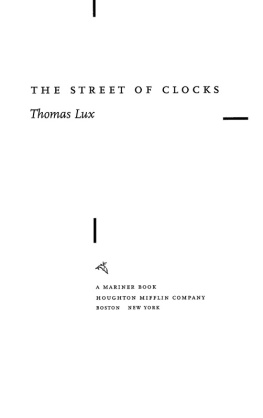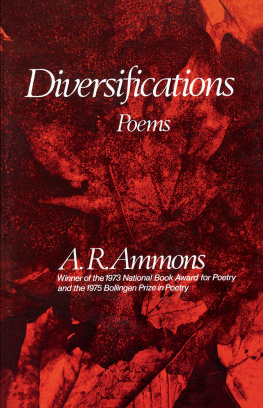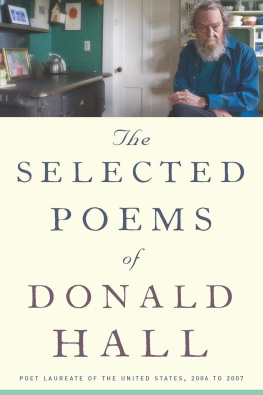First Mariner Books edition 2003
Copyright 2001 by Thomas Lux
All rights reserved
For information about permission to reproduce selections from this book, write to Permissions, Houghton Mifflin Company, 215 Park Avenue South, New York, New York 10003.
Visit our Web site: www.houghtonmifflinbooks.com.
Library of Congress Cataloging-in-Publication Data
Lux, Thomas, date.
The street of clocks / Thomas Lux.
p. cm.
ISBN 0-618-08624-2
ISBN 0-618-25750-0 (pbk.)
I. Title.
PS 3562.U87 S77 2001
811'.54dc21 00-066976
Printed in the United States of America
WOZ 10 9 8 7 6 5 4 3 2
Book design by Melissa Lotfy
Type is FontShop Scala
Many of the poems in this book appeared in the following magazines: The Atlantic Monthly, The American Poetry Review, The Kenyon Review,Shenandoah, Controlled Burn, Poetry International, Washington Square,Fence, The San Diego Reader, The Harvard Review, and The Cider PressReview.
for Claudia Kilbourne Lux, my daughter,
and for Stephen Dobyns, my friend
The fact is the sweetest dream that labor knows.
ROBERT FROST
I am certain of nothing but the holiness of the
Heart's affections and the truth of the Imagination.
JOHN KEATS
Cucumber Fields Crossed by High-Tension Wires
The high-tension spires spike the sky
beneath which boys bend
to pick from prickly vines
the deep-sopped fruit, the rind's green
a green sunk
in green. They part the plants' leaves,
reach into the nest,
and pull out mother, father, fat Uncle Phil.
The smaller yellow-green children stay,
for now. The fruit goes
in baskets by the side of the row,
every thirty feet or so. By these bushels
the boys get paid, in cash,
at day's end, this summer
of the last days of the empire
that will become known as
the past, adios, then,
the ragged-edged beautiful blink.
The Man into Whose Yard You Should Not Hit Your Ball
each day mowed
and mowed his lawn, his dry quarter-acre,
the machine slicing a wisp
from each blade's tip. Dust storms rose
around the roar, 6 P.M. every day,
spring, summer, fall. If he could mow
the snow he would.
On one side, his neighbors the cows
turned their backs to him
and did what they do to the grass.
Where he worked, I don't know,
but it set his jaw to: tight.
His wife a cipher, shoebox tissue,
a shattered apron. As if
into her head he drove a wedge of shale.
Years later, his daughter goes to jail.
Mow, mow, mow his lawn
gently down a decade's summers.
On his other side lived mine and me,
across a narrow pasture, often fallow
a field of fly balls, the best part of childhood
and baseball. But if a ball crossed his line,
as one did in 1956
and another in 1958,
it came back coleslawhis lawnmower
ate it up, happy
to cut something, no matter
what the manual said
about foreign objects,
stones, or sticks.
Plague Victims Catapulted over Walls into Besieged City
Early germ
warfare. The dead
hurled this way turn like wheels
in the sky. Look: there goes
Larry the Shoemaker, barefoot, over the wall,
and Mary Sausage Staffer, see how she flies,
and the Hatter twins, both at once, soar
over the parapet, little Tommy's elbow bent
as if in a salute,
and his sister, Mathilde, she follows him,
arms outstretched, through the air,
just as she did on earth.
Bonehead
Bonehead time, bonehead town. Bonehead teachers.
Bonehead mom, bonehead dad, bonehead aunts
and uncles and cousins too.
Bonehead me, bonehead you.
Bonehead books, playground, box lunch, fast food,
tract homes, Sunday school.
Bonehead Truman, McCarthy, Eisenhower too.
Bonehead me, bonehead you.
Bonehead music, TV, H-bomb, movies,
butch cut, tail fins, baby boom.
Bonehead Russia, America, England too.
Bonehead me, bonehead you.
Beauty School
On the Avenue of Fashion
in the noted necropolis, kitty-corner
from a croissant shop
and four blocks down
from a dozen banks,
is the campus of the Beauty School,
where we learn to walk
assuming we are watched
and where, somewhere, in each book
is placed a mirror: Lost in books,
we say, late for a study break
date, I got lost
in the text. The teacher
stands at the front
of the room: he's the teacher.
The students sit in rows,
those with cheaper haircuts in the rear.
The class is Aesthetics 101.
Beauty is everywhere, the teacher says,
tossing its head.
And when we graduate
the world is there for us, whole, to dread,
to drain.
In the Bedroom Above the Embalming Room
a man sits on the bed's edge in a white T-shirt,
white socks. He is my neighbor,
the local undertaker.
His wife lies behind him, reading a book,
the sheet drawn up above her breasts.
Otherwise, it would be impolite to look.
Or to look I'd wait until they dressed.
From my window they make a kind of X.
I've seen her feed the birds,
but not so much they stay
too long and leave their lime
to stain her deck and waste her time
in washing it away.
So We Can See the Snakes Coming
we cut the lawn
down to the dirt that holds its rootsthe aesthetics
of landscape
less important
than the fear for our lives
and our low supplies
of antivenin. Primordial ghost-pulses, so deep
in our cells' root cellars,
so many colliding, lost, and crossing
bloodstreams.... Which is why one woman,
so afraid of snakes
she cannot bear to see one, even in pictures,
which is why when
she opened the curtains
of her suburban living room's wide window (with mountain
view), she saw
a dozen snakes loop and lash
atop her flat-top shrubs.
Who was in the herpetarium, her or them?
Some several eons ago, in her family tree,
the tree in which
her family literally lived,
a distant relation
died by snake,
and thereafter one or two each century,
for thousands of centuries,
in this manner also die.
She knows this in her marrow: what she fears
she has reason to fear.
Thomas the Broken-Mouthed
A sack on his back, his burlap shirt flapping in a devil's wind,
Thomas the Broken-Mouthed
walks up and down
the bad land, and amidst the bad believers,
he was born in, and among.
He walks up and down, his big wooden stick striking
the road just ahead of the two still
unsettled puffs of dust
his bare feet raise. Thomas the Broken-Mouthedcalled thus
for his lies, say some,
called thus for other reasons, some others say.
In each village two or three fall behind himdisaffected vendors
of drowsy syrups, stiff-fingered cutpurses, sour
camel drivers, well poisoners, and children (milky-skinned,
pockmarked), children of the rich,
of prelates, pushing before them
wooden-wheeled barrows of grain
to bake into bread
to eat on the march. Thomas the Broken-Mouthed has a mission,
within which is a vision,
within which
is a tiny black fire. Who will pile the drought-dried straw on this fire,
who will be the naphtha resin,
who will follow the fire,
who will be the sparks with fiery wings for me? asks
Thomas the Broken-Mouthed,
standing on a tree stump that reveals
one hundred rings, one hundred years
that the books now call The Last One Hundred Years.
The Handsome Swamp
knows it's a handsome swamp: the alligators
tell it so, as do the water lilies (always
sycophantic) and their pads. The bug life
stands on its hind legs
Next page







